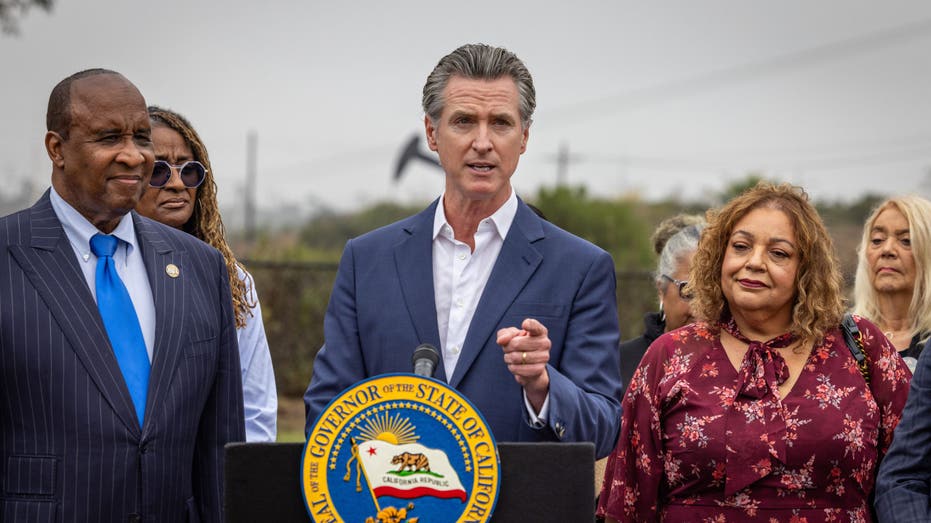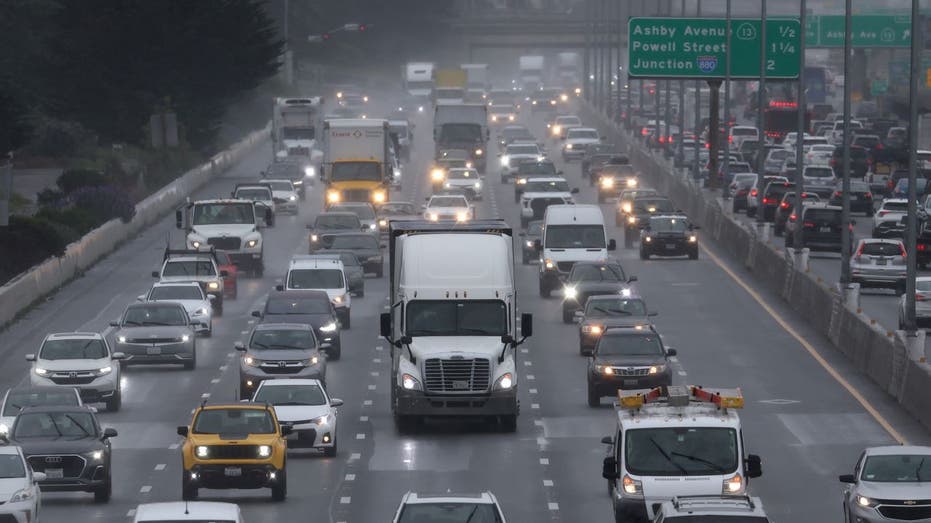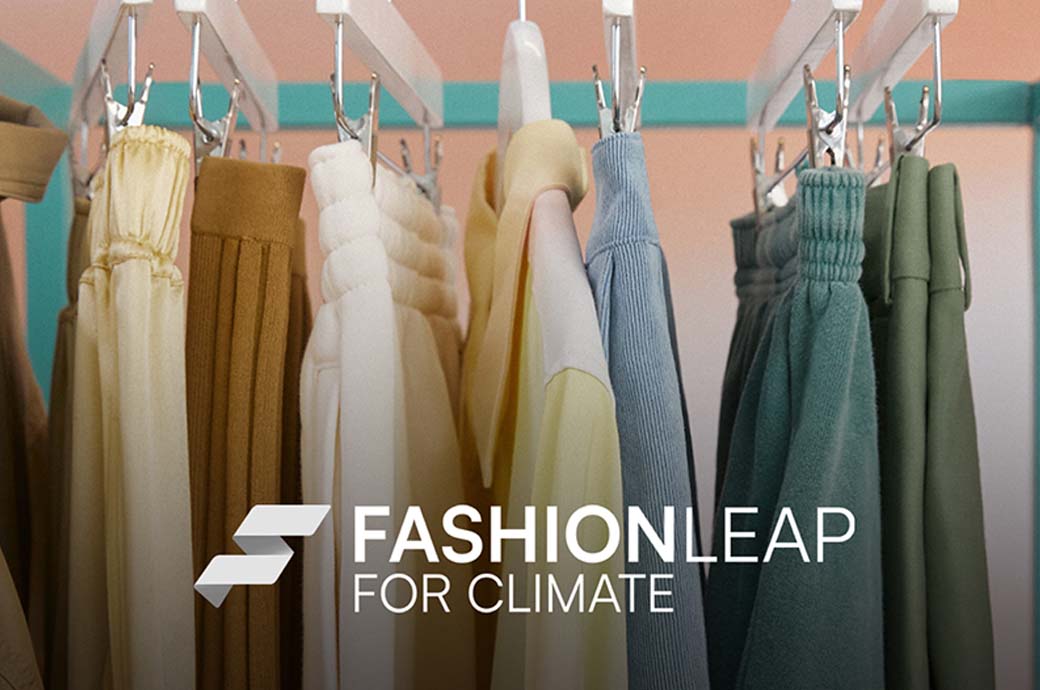Bussiness
GOP business group alleges California set up illegal cartel to push for electric trucks

Michael Buschbacher, an attorney representing the American Free Enterprise Chamber of Commerce, speaks to FOX Business about the group’s lawsuit challenging California’s Clean Truck Partnership agreement.
FIRST ON FOX — A Republican pro-business group and Midwest trucking operators say California regulators have illegally sidestepped federal law to force a transition to electric trucks.
The American Free Enterprise Chamber of Commerce (AmFree) and trucking operators allege in a new lawsuit that California has created a cartel arrangement with the nation’s largest heavy-duty truck companies to phase out internal-combustion engines by 2036. The alleged scheme involves the California Air Resources Board (CARB) and all major manufacturers of gas-powered heavy-duty trucks that entered into an agreement called the Clean Truck Partnership last year.
“The agreement bakes into it a number of rules that California has been trying to get in place that will mandate the complete electrification of the trucking sector in just over a decade,” said Michael Buschbacher, lead attorney for AmFee.
While most states are prohibited from setting their own motor vehicle emissions standards, California has exclusive permission to do so under the Clean Air Act of 1967, so long as their rules are approved by the Environmental Protection Agency. But AmFree alleges California has unlawfully attempted to enforce emissions standards without a green light from the EPA.
NEBRASKA AG LAUNCHES ASSAULT AGAINST CALIFORNIA’S ELECTRIC VEHICLE PUSH
A new lawsuit alleges California regulators have unlawfully colluded with major heavy-duty truck manufacturers to enforce emissions standards that were not approved by the EPA with the intent of phasing out gas-powered trucks. (Andreas Gebert/Bloomberg via Getty Images/File)
“If you don’t have permission from EPA, you can’t even attempt to enforce those [kinds] of standards. These are standards for emissions for new motor vehicles. And that’s what this agreement is about. And our argument is that that’s illegal, and it has to stop,” said Buschbacher.
CARB did not immediately respond to a request for comment.
The complaint states that climate regulators in California have produced “a typhoon of coercive and disruptive regulations” intended to meet Democrat Gov. Gavin Newsom’s goal of having all heavy-duty vehicles in the Golden State be “zero-emission” by 2045.
But in July 2023, California offered major truck manufacturers temporary regulatory relief in exchange for commitments to adopt vehicle standards “that will require the sale and adoption of zero-emissions technology in the state, regardless of whether any other entity challenges California’s authority to set more stringent emissions standards under the federal Clean Air Act,” according to CARB.
This agreement, which gave truck manufacturers “reasonable lead time” to comply with California emissions standards, is known as the Clean Truck Partnership. Manufacturers that were party to the agreement and are named in the lawsuit include Cummins Inc., Daimler Truck North America, Ford, General Motors, Hino Motors Limited Inc., Isuzu Technical Center of America Inc., Navistar, Paccar, Stellantis N.V., Volvo Group North America and the Truck and Engine Manufacturers Association, an industry trade group.
“In return for recognizing CARB’s suzerainty, however, manufacturers have obtained a cozy cartel arrangement that ensures them a steady stream of supra-competitive profits, subsidies, and tax credits,” the lawsuit alleges.

Democrat Gov. Gavin Newsom of California has set ambitious targets to have the Golden State require all heavy-duty trucks to be electric vehicles within the next two decades. (Jason Armond/Los Angeles Times via Getty Images/File)
“By acting in lockstep as an industry, this arrangement ensures that the costs will not be borne by the manufacturers but will be passed downstream to their customers and then to the rest of the country.”
Two trucking companies, Meiborg Brothers Inc. and TanTara Transportation Corp., provided declarations for AmFree’s lawsuit, claiming harm from California’s actions.
The companies say some manufacturers are now requiring them to purchase one electric truck for every seven to eight diesel trucks they purchase or face higher prices. In court documents, the operators allege they will lose access to nearly a quarter of U.S. truck dealers once California and other states that adopt California standards phase out diesel trucks.
They also argue that electric trucks cost more upfront and have higher maintenance and resale costs, which cannot be fully passed on to consumers.
“The consequences here are they’re going to drive up costs and reduce consumer choice,” Buschbacher said.
CALIFORNIA BOARD MOVES TO BAN GAS-POWERED CARS BY 2035 IN FAVOR OF ELECTRIC VEHICLES

Truck operators say California’s strict emissions standards have caused them harm by increasing costs and limiting consumer options. (Justin Sullivan/Getty Images/File)
“If you think grocery prices are bad now under the Biden-Harris administration, this is going to drive them up further. If you think that it costs too much to rent a U-Haul to move across town, those things are going to go up as a result of this,” he said.
The AmFree lawsuit follows similar litigation launched by Nebraska Attorney General Mike Hilgers, who has accused CARB and trucking manufacturers of engaging in an “industry-wide conspiracy” to eliminate trucks that run on liquid fuel.
Hilgers told Fox Business these four companies have openly admitted to “colluding in a classic antitrust way.”
CLICK HERE TO GET FOX BUSINESS ON THE GO
Like Nebraska, AmFree seeks a court order to block the Clean Truck Partnership from being enforced.
“California has its own view of how things should be, and that’s an all-electric future. But that’s not a smart way of addressing climate policy,” said Buschbacher. “We should have an innovation that is technology-neutral in the United States that moves towards clean solutions in ways that actually grow the economy and improve our way of life. And this does the opposite.”









